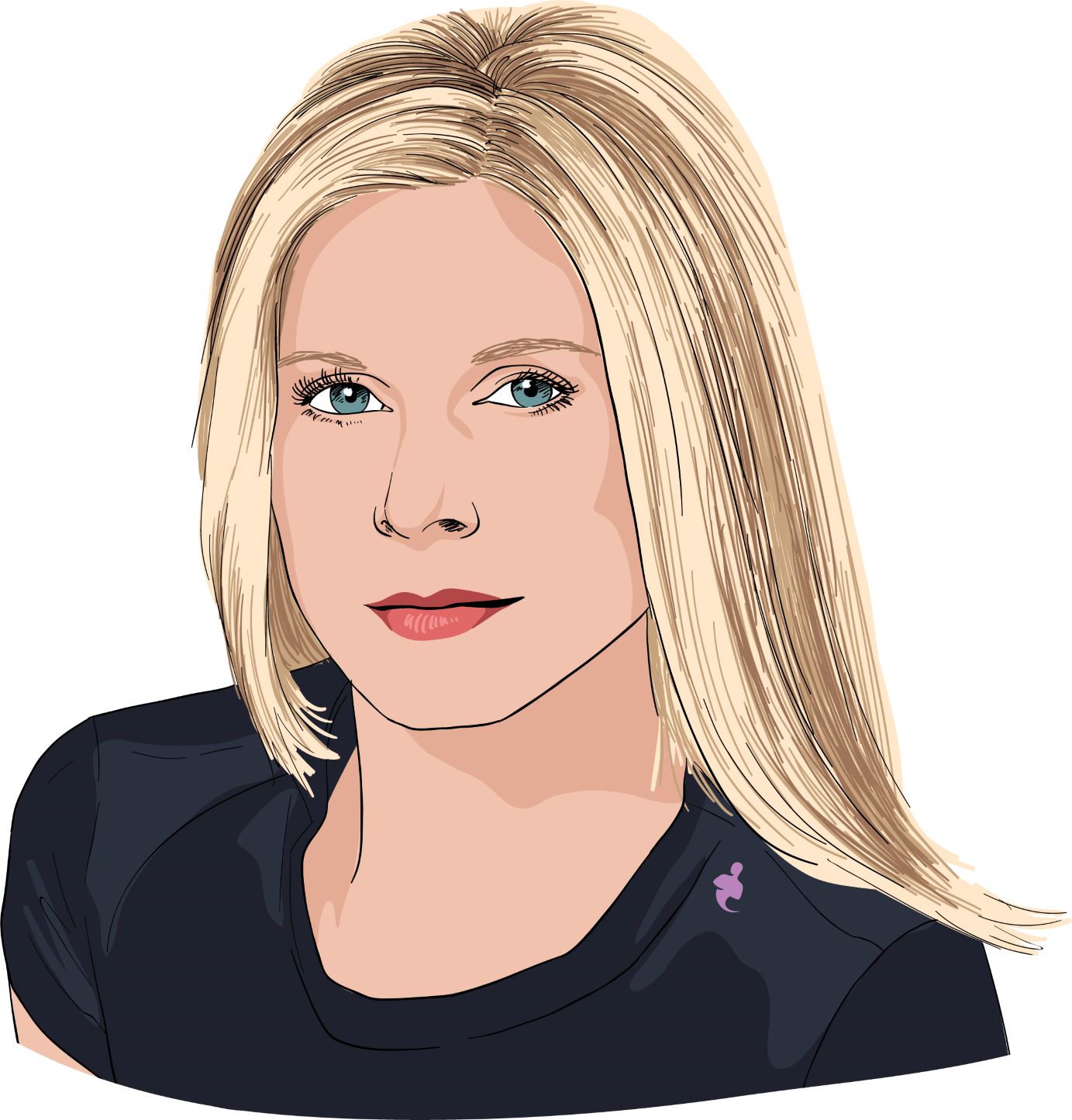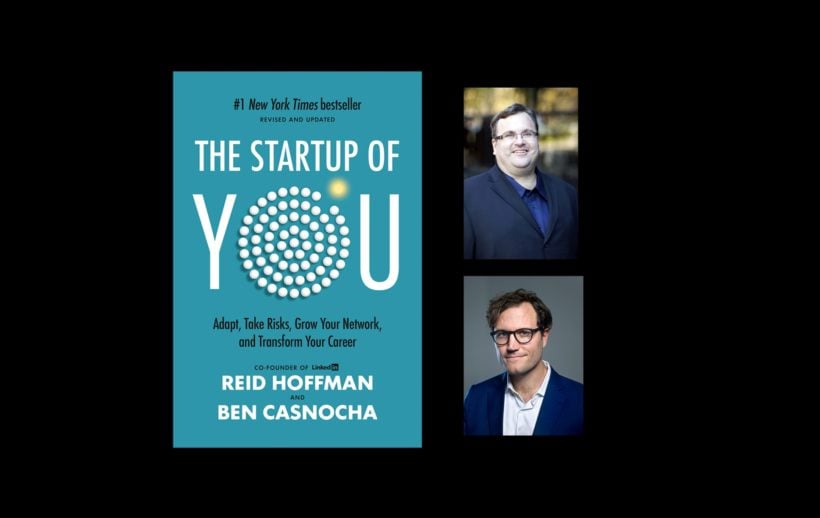StartupNation |
- Using a Startup Mindset to Benefit a Legacy Business
- Learn How to Ace Growth Challenges in Your New Business
- Is Working Weekends Worth It? Self-Made Millionaires Weigh In
- WJR Business Beat: Unify Online and Offline Marketing for More Sales (Episode 417)
- Decentralized Crowdfunding: How Much Can a Startup Raise?
- Techstars’ Monica Wheat and Dell’s Mobolaji Sokunbi: Why Your Business Needs DEI Focus
- 6 Tips to Help Find Empowerment Through Embracing Failure
- WJR Business Beat: Startup Founders’ Biggest Concern? Funding (Episode 416)
- Hard Lessons I Learned on My Journey as an Entrepreneur
- 5 Tips for Starting a Business
- ‘The Startup of You’: Why You Need to Embrace Your Free Agency
| Using a Startup Mindset to Benefit a Legacy Business Posted: 01 Jun 2022 09:53 PM PDT
When you think of innovation and dynamism in the business world, what comes to mind first? Maybe it's a young company that's growing at hyper speed. Maybe it's a charismatic young founder who's using technology to solve big problems. The common denominator in these examples is one word: young. But innovation and dynamism aren't just for startups and young businesses. In fact, if you consider some of the largest, most successful, longstanding brands in the world, those organizations' ability to thrive has hinged upon their ability to innovate and adapt while still delivering the product or service their existing customers have come to rely on. I'm the CEO at Cempa Community Care, a community health organization in Chattanooga, Tennessee. When I was brought on as a consultant in 2015, the organization was in disarray. Our executive director had just left, along with the finance director. At that time, the organization was still operating under its original name, Chattanooga CARES (Council on AIDS, Resources, Education, and Support), and was nearly 30 years old. It was founded upon a stellar mission, but it wasn't thriving. The more I dug in, the more passionate I became about righting the ship. I was quickly appointed interim executive director and eventually CEO. Today, our organization is in a great spot. We hold a strong financial position with a healthy balance sheet and have increased revenue streams by diversifying and expanding. Over the past seven years, I've learned so much about how a legacy organization can use a startup mentality to stay relevant and meet clients' evolving needs. For Cempa, that meant a rebrand, updates to our services, staffing changes and more. For you, it might mean undergoing a digital transformation to better connect with customers in the digital age. Whatever the need, the following tips will help keep you on the right track.
When Chattanooga CARES was founded in 1986, the United States was at the height of the HIV/AIDS epidemic. In our area, community members came together to find support in a time when resources were limited and stigmas were high. Over the years, things changed. Prevention and treatment methods advanced. Eventually, and thankfully, HIV was no longer a death sentence. Survivors and their loved ones still needed support, but the type of support they needed evolved. When I joined the organization, one of the first things we did was undergo a rebrand. Sure, much of our community was familiar with Chattanooga CARES and the wonderful services it provided. But just the organization's services had evolved so drastically, it was time for a substantial change to our brand. Now we're Cempa Community Care. "Cempa" means champion in Old English. We are still championing the health and wellness of underserved communities, but we're doing so much more than HIV/AIDS care. Our new brand better represents who we are today. Businesses change. Customers' needs change. Take a moment to reflect on where you've been, where you are now, and where you'd like to go in the future. If your existing brand doesn't do a good job of projecting the right image, it's OK to undergo some level of a rebrand — even one as significant as changing your name. 9 Signs Your Business Needs Rebranding |
| Learn How to Ace Growth Challenges in Your New Business Posted: 01 Jun 2022 09:00 PM PDT
Before all else, if you’re about to start your journey as a new business owner, congratulations! And welcome to the entrepreneurial world. Before setting the wheels in motion, discover the various growth stages your business will go through, their associated challenges and how to tackle them. There's no doubt that if you’re about to embark on a new business journey, you've already been taken aback by the overwhelming emotions that go hand-in-hand with taking on such responsibility. Feelings of excitement, amazement, stress and anticipation, just to name a few, and it's no wonder. Starting your own business is just the beginning. Having taken the first step, your focus now is to maximize potential for profitability by ensuring anticipated growth transpires. Most Popular: 10 Negotiation Techniques to Make You a Better Entrepreneur |
| Is Working Weekends Worth It? Self-Made Millionaires Weigh In Posted: 01 Jun 2022 09:00 PM PDT Some top executives believe you need to work on the weekends to be successful in today's connected world. Others stress the importance of setting boundaries and disconnecting. We asked six self-made millionaires and Advisors in The Oracles whether they think working on weekends is the secret to success: 1. "How you spend your time says everything about what you value." "As a leader, you must have a clear sense of priorities and an ability to say no to things. My key priorities are family and work. For work, at any given time, I have a list of three things that I am working on that add real value for our customers, team members, and shareholders. I have three kids ages 16, 14 and 12. Since I travel during the week, I don't go out when I am home in Washington, D.C. I dedicate the weekends to my family, and we have a family dinner together every Friday night. I believe our choices become our actions, our actions become our habits, and our habits become our character. I also believe that how you spend your time says everything about what's important to you." —Marla Beck, cofounder and CEO of Bluemercury, which was acquired by Macy's for $210 million; creator of M-61 Skincare and Lune+Aster cosmetics 2. "Work-life balance is a myth." "Work-life balance is a myth. I don't switch on and off between work and life; it all happens simultaneously. I don't actively pursue working more or less. I work whatever amount of time is needed and take off whatever amount of time is needed. I get to see my wife all the time because she's part of the company. I do take vacations, but I rarely unplug completely. This requires bringing joy to everything, whether it's work or play, and being highly effective — not busy for the sake of being busy. For example, I've created a life where I don't have to commute so I don't waste time in the car. And I'm always accessible for those who rely on me, whether my wife wants us to take a day off together or my team needs me while I'm on vacation." —Patch Baker, founder and CEO of Mobius Media Solutions; former U.S. Marine, with a mission to help people leave the military today and not feel abandoned tomorrow 3. "Success requires building relationships around the clock." "When you own a business, you have to make your customers' needs a priority. There is no such thing as a day off, especially in real estate. Not working on the weekend is simply not an option, because that's when most people are looking for a new home. Being successful in real estate requires operating 24 hours a day, seven days a week, 365 days a year. To be successful in any business, you must be accessible, approachable, and customer-service oriented. Before the end of each day, I make a point to respond to emails and social media messages. Whether I'm answering questions or sharing a kind word, it's all about building and maintaining relationships. Real estate in particular is predicated on connections, whether they're personal or business, digital or in-person. So even if I'm not working with a client or taking care of a business need, I'm always creating and building relationships through networking." —Dottie Herman, CEO of Douglas Elliman, a real estate brokerage empire with more than $27 billion in annual sales; connect with Dottie on Facebook and Instagram 4. "We shouldn't differentiate between the week and the weekend." "Differentiating between the week and the weekend is part of the problem with this conversation. While we can certainly delineate between when it's time to work and when it isn't, the actual concept of work has changed a lot since those parameters became commonplace. Finding work-life balance isn't just about separating the week from the weekend; rather it's about finding a balance that speaks to the way you work. For me, that means the weekend isn't off limits. But to counterbalance that, I know that I don't have to work all 40 hours of a traditional workweek. My life is very fluid, with a combination of getting it done when it needs to get done and powering off when I'm off. So while Sunday morning is a prime time for me to catch up on emails, on Friday afternoons you'll find me hiking in Colorado this summer." —Dennis Najjar, cofounder of AccountingDepartment.com, a virtual accounting service for small businesses; connect with Dennis on LinkedIn 5. "Boundaries will set you free." "Entrepreneurs can build businesses that either serve or enslave them. When I was getting started, I let my companies run me ragged. It's easy to become a ‘human doing’; but setting boundaries, whether it be around weekends, mornings, or evenings, gives you the space to be a human being. For me, that was the key. Now I delegate urgent tasks like customer service and sales so I can focus on big-picture business development. Set expectations about how quickly you will reply to emails, and don't have your work email on your phone. Establish a hard stop time when you leave the office every day. It helps to coordinate your schedule with your spouse, if you have one. Finally, turn off your phone a few hours before bed for quiet time where your only focus is family, personal development, and white space. If you find yourself running out of time in the day, audit your tasks to identify busy work that shouldn't be on your plate." —Ryan Dossey, real estate broker and investor who owns more than 125 rental units across the Midwest; founder of Call Porter and Ballpoint Marketing, and partner at Stewardship Properties 6. "Wherever you are, be there fully." "As a committed husband and father of three young children who values personal time, I generally reserve evenings and weekends for my family. I focus and work diligently on weekdays so I can be fully present and enjoy activities with them. At the same time, work is an integrated part of my life. It's my mission and playground. I love what I do, and would still do it if I won the lottery tomorrow. So I've involved my family in our purpose and what we're working toward. That way, if I do need to check emails, take calls, travel or work in the evenings or on weekends, it's not a big deal. I just have to be intentional, plan ahead and openly communicate in advance to set expectations. So many people think about their family while they're at work and think about work while they're with their family. Wherever you are, be there fully." —Tom Shieh, CEO of Crimcheck; advisory board member to Defy Ventures; advisor to Tiny Devotions; connect with Tom on Facebook Want to share your insights in a future article? Join The Oracles, a mastermind group of the world’s leading entrepreneurs who share their success strategies to help others grow their businesses and build better lives. Apply here. For more articles like this, follow The Oracles on Facebook, Twitter and LinkedIn. Originally published on CNBC on July 27, 2019. StartupNation exclusive discounts and savings on Dell products and accessories: Learn more here |
| WJR Business Beat: Unify Online and Offline Marketing for More Sales (Episode 417) Posted: 01 Jun 2022 08:14 AM PDT
On today’s Business Beat, Jeff discusses the strong alignment between online discovery and in-store purchasing and why you must make the connection between your online presence and your offline presence seamless. Tune in below to learn more:
Tune in to News/Talk 760 AM WJR weekday mornings at 7:11 a.m. for the WJR Business Beat. Listeners outside of the Detroit area can listen live HERE. Are you an entrepreneur with a great story to share? If so, contact us at editor@startupnation.com and we'll feature you on an upcoming segment of the WJR Business Beat! Good morning, Paul! Small businesses rely on social media platforms as a primary way to drive new leads and to engage current customers. In fact, 72% of shoppers report that they rely on social media for discovering new products and 81% of shoppers indicate that they’ve made at least one in-store purchase after discovering an item on social media. So the power of being online, both on social media platforms and with an e-commerce site, is fundamental now. However, what we’re learning now beyond just being online is the power of unifying being online with being offline. This strong alignment between online discovery and in-store purchasing or pickup makes clear that you must now view your business, not as an either/or, e-commerce versus offline, but rather as a single unified one in which the connection between your online presence and your offline presence are seamless and complementary. The lines between e-commerce and physical retail are now becoming blurred in this post-pandemic era, as consumers now view them as one. And when properly aligned, this is a powerful way to use the online channel to drive online sales. You see, consumers want the efficiency of discovering and selecting purchase opportunities online, but they still love the immediacy of brick and mortar along with the experience of being in store. Even if that means that they’re there in store to buy or pick up something they’ve already shopped for and/or even purchased online. So if you’re a small business looking to get ahead, make sure you focus on building an online/offline presence for your business that work in concert to move customers from discovery to purchase to pickup in a seamless, efficient way. I’m Jeff Sloan, founder and CEO of startupnation.com, and that’s today’s Business Beat on the Great Voice of the Great Lakes, WJR. StartupNation exclusive discounts and savings on Dell products and accessories: Learn more hereThe post WJR Business Beat: Unify Online and Offline Marketing for More Sales (Episode 417) appeared first on StartupNation. |
| Decentralized Crowdfunding: How Much Can a Startup Raise? Posted: 31 May 2022 09:00 PM PDT
When it comes to funding, startups have several options. They can go the traditional route and seek out angel investors or venture capitalists. Or they can crowdfund their projects through platforms like Kickstarter or Indiegogo. But there’s a new option on the block (pun intended) that could be a game-changer for startups: decentralized crowdfunding. Decentralized crowdfunding is still in its early days, but it has the potential to shake up the startup funding landscape. So how does it work, and what are the benefits? Read on to find out. What is crowdfunding?Let’s start with the basics. One of the major hurdles startup founders has to cope with, besides coming up with a good product or service, devising a good business model, hiring the right talent and countless other difficulties, is funding their project to get things going. Crowdfunding is a strategy to get support for your project from many people rather than from a small number of investors or venture capitalists. You can use this strategy to fund all sorts of projects, ranging from startups and artistic endeavors like films and music albums to political campaigns, scientific research projects, and even funding an expensive medical treatment for yourself or a loved one. Angel investors and venture capitalists have always been an option for startups, but they come with some serious drawbacks, the most important of which is losing equity and, ultimately, being told how to run your own business. As you’ll learn in any in-person or online startup accelerator, crowdfunding helps solve this issue by letting you get funding from a large number of people who sometimes don’t ask for equity in your company. Even if they do, since third-party participation is diluted among many investors, you’ll still be the main shareholder and keep calling the shots. The downsides to traditional crowdfundingAlthough very promising, traditional crowdfunding also has its drawbacks. For one thing, it’s not always easy to get your project funded. You have to convince many people of your startup’s value, which requires creating a good pitch and campaign. Even then, there’s no guarantee that people will be interested in what you’re doing. Additionally, even if you do manage to get funding, most platforms take a cut of the funds raised. Kickstarter, for example, will take 5% off every project, and then you have payment and transfer fees to worry about, among other expenses. Additionally, intellectual property rights can be a serious issue. If you don’t protect your idea early on, someone might steal it when they see your pitch and launch your company before you do, if they have the financial muscle to do so. Some of these downsides can be offset with the new trend in crowdfunding: decentralized or blockchain-based crowdfunding. From VC to DeFi: 6 Realistic Ways to Fund Your StartupSo what is decentralized crowdfunding?Decentralized crowdfunding is a new way of raising funds based on blockchain technology. Blockchain is the same technology that underlies cryptocurrencies like Bitcoin and Ethereum. In a nutshell, it’s a distributed database that’s secure and tamper-proof and that eliminates the need for a trusted third party to verify transactions. How does decentralized crowdfunding work?With decentralized crowdfunding, startups raise funds by selling tokens or coins to investors. These offerings are referred to as Blockchain-Based Offerings or BBOs. Investors can use these tokens or coins to access the startup’s products or services once the project takes off, or the tokens can represent debt instruments, securities or other investment vehicles. Additionally, if the startup is successful, the value of the tokens themselves may increase considerably. This allows investors to capitalize on their investment simply by using different online brokers or crypto exchanges to trade the tokens for a profit. One of the key elements that blockchain technology applied to crowdfunding offers is smart contracts. These are digital programs that execute automatically when certain conditions are met. This key element allows for the development of platforms that work without the need for human involvement, making each transaction secure and fast. In addition to eliminating intermediaries, this also eliminates most fees, which can be considerable if you have a large number of backers. How Do Smart Contracts Work for Startups?Pros and cons of decentralized crowdfundingThere are several advantages of decentralized crowdfunding, the most important of which are:
On the downside, decentralized crowdfunding is still a relatively new concept, and not many platforms offer this service. Also, ever since the boom of cryptocurrency ICOs, many of which turned out to be total scams to steal from the unassuming public, there has been a lot of mistrust towards any funding platform that uses blockchain technology. Kickstarter, for example, recently announced that it would be transitioning to blockchain technology, and it generated a backlash within the investor community. With many risk-averse investors following the advice from trusted investment newsletters and many of those newsletters pointing out the risks of crypto investing and ICOs in general, it's no wonder why. Finally, many worry about the environmental impacts of blockchain technology in general because of the high energy consumption required to run a blockchain network. Despite the potential downsides and limitations of decentralized crowdfunding, it’s clear that this is the future of fundraising for startups. If you’re thinking about starting a company, it’s worth considering this option to see if it’s a good fit for your project. But this brings up an important question. How do startups raise money through decentralized crowdfunding?As mentioned previously, funding through decentralized crowdfunding works by offering different types of tokens through blockchain-based offerings or BBOs. The first step to decentralized crowdfunding is choosing what type of BBO you’ll offer to investors. There are three basic types BBOs startups can choose from when raising money:
Let’s look at how these different BBOs work. Initial coin offerings or ICOsIn an ICO, a startup offers utility tokens to investors, which are digital assets that are not associated with your company’s equity. These tokens are digital products investors can use on an online platform to pay for your startup’s products or services. These tokens work through smart contracts that run on a blockchain. Investors who buy into an ICO pay with cryptocurrencies like Bitcoin or Ether, and once the smart contract verifies the payment, it automatically transfers ownership of the token to the investor and registers that ownership in the blockchain. Security token offerings or STOsSecurity token offerings, or STOs, are similar to ICOs in that they both offer digital assets as investment opportunities. However, unlike utility tokens, security tokens represent actual equity in your company and are thus subject to government regulations. Initial exchange offerings or IEOsInitial exchange offerings or IEOs are a type of BBO that is becoming increasingly popular. In an IEO, a startup raises money by selling tokens to investors through a cryptocurrency exchange. These exchanges act as intermediaries between the startup and the investor and help to promote the IEO among their user base. With crypto exchanges like Binance that have millions of users, your project reaches a potentially huge audience. How much money can you raise through decentralized crowdfunding?The answer to this question is not straightforward. It depends on several factors, including the type of project you’re working on, the quality of your pitch and the platform’s popularity. That said, there are some platforms where successful projects have raised millions of dollars. DAO (Decentralized Autonomous Organization) conducted the first major ICO in 2016. The startup raised a staggering 10.7 million ether, worth around $120 million at the time. Today, however, with each ether worth almost $3,000, the money DAO raised is worth an incredible $30 billion. Of course, this has been the exception and not the rule. However, a report by TeQatlas from 2019 can give us some very good insight into how much the average startup can raise through ICOs, STOs and IEOs. According to the report, at the peak of the ICO boom in 2018, companies raised $15,248 million through 460 rounds. That makes an average of $33 million per round. That was the boom, and, for sure, some companies raised significantly more than others, driving the average up considerably. Even though 2018 was a peak, 2019 wasn’t half bad. While the overall amount raised was significantly less, totaling a little over $2 billion in H1, that amount was raised after 153 rounds, averaging almost $14 million per round. Not bad at all. Do take note that, as stated above, many early projects turned out to be scams and some investors lost a lot of money. This triggered a downward trend after 2018 that has only now stabilized. It isn’t clear exactly how much money you stand to raise through the more recent decentralized crowdfunding platforms. But it’s worth noting that the newer kids on the block are coming up with different ways to increase investor confidence. One way they’re achieving this goal is by adding milestones to the smart contracts that only payout after those milestones are achieved. This reduces the risk and makes it more likely that you’ll be able to achieve both your fundraising goals and your business goals in the long run. The bottom lineCrowdfunding has become a popular alternative to traditional startup funding through angel investors or venture capitalists. However, traditional crowdfunding platforms suffer from several pitfalls related to high fees and intellectual property theft. Decentralized or blockchain-based crowdfunding poses a viable alternative, but it isn’t perfect, either. Regardless, it is still in its early stages, and companies or platforms that offer these services are devising new and creative ways to reduce risk and increase investor confidence. As this evolves, it will become ever easier for startups to find the funding they need to go from idea to market without losing equity while providing their investors with value and a good ROI. StartupNation exclusive discounts and savings on Dell products and accessories: Learn more here |
| Techstars’ Monica Wheat and Dell’s Mobolaji Sokunbi: Why Your Business Needs DEI Focus Posted: 31 May 2022 09:00 PM PDT "Their talent is everywhere, but opportunity is not." Learn what Monica Wheat, executive director of Techstars and cofounder of Venture Catalysts, and Mobolaji Sokunbi of Dell Technologies have to say about DEI (diversity, equity and inclusion) as it relates to women and people of color in the entrepreneurial ecosystem and how it can benefit businesses. Tune in below:
Among the topics, Monica Wheat and Jeff Sloan discuss:
Among the topics, Mobolaji Sokunbi and Jeff Sloan discuss:
StartupNation exclusive discounts and savings on Dell products and accessories: Learn more hereThe post Techstars' Monica Wheat and Dell's Mobolaji Sokunbi: Why Your Business Needs DEI Focus appeared first on StartupNation. |
| 6 Tips to Help Find Empowerment Through Embracing Failure Posted: 31 May 2022 09:00 PM PDT
Launching a business is an exciting, and challenging, prospect. Unfortunately, there will always be times at which you experience unexpected roadblocks as an entrepreneur. It might be misplaced trust in an unreliable partner, lost revenue, or economic upheaval that puts your venture on shaky ground. Regardless of the specifics, you must understand that mistakes and failures are inevitable in the startup world. In fact, you'll probably fail much more often than you succeed over the course of your entrepreneurial journey. Failure isn't easy to accept. If you're not prepared for it, failure can lead you to doubt whether you'll ever be able to pick yourself back up again. However, I'm here to say that failure is not the end of the road. In fact, it's an important part of your growth as a leader. Here are six tips that will empower you to view failure as an opportunity to learn, grow and succeed:Be prepared The first step of embracing failure is acknowledging that it could happen at any moment. Having a business continuity plan is a step in the right direction, but it's also important to remember that even the most well-laid plan is subject to disruption. The current COVID-19 pandemic should be evidence of that on its own. You want to be prepared, but at the end of the day, you need to make peace with the idea that you can't predict the future. The unexpected will happen, and you will make mistakes in response to it. Failure doesn't have to mean the end of the world, though, as long as you're ready to adapt. In contrast, your organization (and all the people who depend on it) will pay the price if you're immobilized by shock when something unexpected happens. Don't let fear rule you If left unchecked, fear can play a crippling mind game. If your fear of making a mistake prevents you from moving forward, it will cost you more than the actual mistake ever could. Avoid rationalizing your fear by saying things like, "I'm just waiting for the right time." Procrastination can lead to lost opportunities and self-doubt. The best way to conquer your fear is simply to make a decision, commit and start working. Throughout your startup journey, you will be faced with choices, some of which will pay off while others won't. Still, it's better to have trusted your instincts and seized an opportunity than to allow fear to dictate your life. Related: 5 Questions Every Aspiring Entrepreneur Should Ask Before Starting UpDon't dwell on mistakes I'm reminded of the familiar adage, “When you fall off the horse, get back on.” I believe this is a lesson with which all entrepreneurs should make peace. When you experience failure, your first instinct might be to sit down and unpack, analyze and stress over every minute detail. On the one hand, it is important that you take the time to figure out what went wrong and learn how to do better in the future. But, there's a difference between thoughtfully and strategically processing failure and allowing it to consume your thoughts and drain your motivation. Don't spend unnecessary time and energy dwelling on your mistakes. Take what you need, dust yourself off, and keep going. Stay positive As difficult as it is to experience failure, it's important that you look for the silver lining in every situation. Negative self-talk can be detrimental to your psyche and how you approach business going forward. Positivity in the face of adversity can make all the difference between remaining stagnant and pushing through setbacks. Don't beat yourself up over past or present failures. If you're going through an exceptionally challenging time, remember that nothing lasts forever.
Take responsibility Admitting that you messed up is a tough pill to swallow. None of us want to admit we were wrong, especially when other people are counting on our leadership or expertise. That said, taking responsibility for your actions is also the key to moving past your failure. You may be tempted to place the blame on others or to look for excuses to explain why something didn't work out. This will only prolong feelings of frustration and embarrassment, and can also fray your relationships with people and ruin your credibility. It's much better to simply own up to what happened and move beyond it. Until you acknowledge your mistake, you can't find a solution or move past it. You might find yourself in an endless cycle of placing blame while never actually achieving anything. Sign Up: Receive the StartupNation newsletter!Learn Some of the greatest lessons I've ever learned in life have been through failure. If I had just given up and wasted time feeling sorry for myself, I would have missed out on wonderful opportunities. For instance, I was an e-commerce merchant prior to launching my current company, Chargebacks911. My own experience with chargebacks is what ultimately drove me to learn more about the subject, and ultimately, to become an expert on the topic, which led to where I am now. Lean into the discomfort of failure, and have confidence in your ability to grow from it. When you've walked through failure and come out on the other side, you have knowledge of how to avoid similar mistakes and can share your experiences to encourage others. Embracing these moments gives you a focused mindset. Failure isn't the end of your story; instead, it's a pivotal moment which you can leverage to improve, grow, and feel empowered. Originally published Dec. 7, 2020. The post 6 Tips to Help Find Empowerment Through Embracing Failure appeared first on StartupNation. |
| WJR Business Beat: Startup Founders’ Biggest Concern? Funding (Episode 416) Posted: 31 May 2022 01:35 PM PDT
On today's Business Beat, Jeff shares worrying news that a pullback in capital investment is impacting startup spending plans and growth. Tune in below for details:
Tune in to News/Talk 760 AM WJR weekday mornings at 7:11 a.m. for the WJR Business Beat. Listeners outside of the Detroit area can listen live HERE. Are you an entrepreneur with a great story to share? If so, contact us at editor@startupnation.com and we'll feature you on an upcoming segment of the WJR Business Beat! Good morning, Paul! We know that the lifeblood for startups is access to early funding to make it all go. Whether from angel investors or venture funds, there’s just no doubt about it, it's simply critical. Well, now new research just published makes clear that there’s a growing sense of concern among U.S. startup leaders, as economic turmoil creates pullback in the capital markets, and that means many startup leaders are now pulling back on their more aggressive spending plans. The new information comes from Qualtrics and now indicates clearly that founders are concerned about their lack of cash to operate and grow, in fact so much so that it’s their No. 1 concern. Eighty-eight percent of the 250 founders surveyed by Qualtrics indicate so. Now what are these startup leaders doing to proceed with more cautious spending? Some are curtailing new hiring while others plan to boost pay to retain existing employees. Even still others are looking toward part-time workforce options and even remote work options to keep costs. Well, Paul, first, it’s the pandemic then supply chain issues and inflation. It’s tough out there for many startups, especially those in pre-revenue early stages of their evolution during which operations and growth are largely dependent on investment by outside investors. Well, we’ll keep an eye on this to follow the trend, and we’ll keep hoping that this is a short-term pullback rather than a prolonged environment now in which capital will be much harder to come by and in which startup growth will be slowed. I’m Jeff Sloan, founder and CEO of startupnation.com, and that’s today’s Business Beat on the Great Voice of the Great Lakes, WJR. The post WJR Business Beat: Startup Founders' Biggest Concern? Funding (Episode 416) appeared first on StartupNation. |
| Hard Lessons I Learned on My Journey as an Entrepreneur Posted: 30 May 2022 09:00 PM PDT
Simply put, starting your own business is a roller coaster of emotions. You get to control your own destiny, you have the freedom to build what you want, where you want and with whom you want, but it doesn't come without challenges. Highs are high, lows are low, and it takes dedication and mental strength to persevere and achieve the goals you set for yourself and your business. With that being said, there are lessons that I learned the hard way and hopefully some of the challenges I faced can help you avoid them. Being the owner doesn't mean things are always in your control.I always said to myself that I wanted to start my own business and be in "control" of my own destiny. I learned that I had to acknowledge from the beginning that you are not in control of everything just because you are the owner of your own business. You are in control of decisions you make for the business, but you are not always in control of the outcome. You get to decide how much money to spend on marketing or what type of campaigns to focus on, but what if they don't work? Fact is, most things don't work the first time, you have to make adjustments, stay optimistic and keep trying! There is a balance between analysis paralysis and doing enough research to make a good, educated decision, but even then, you can be wrong. Common Mistakes Entrepreneurs Make in Their Business Journey |
| 5 Tips for Starting a Business Posted: 30 May 2022 09:00 PM PDT
Starting a business can be very difficult, especially since more than 50 percent of UK startups fail within their first year. In our guide to starting a business, we provide a proven method to become a business champion by positioning your company successfully and allowing staff to establish themselves in the industry. Below are five tips for starting a business: Go into an industry you have a passion forWhen starting a company, you must be doing something you are passionate about. New businesses require a lot of working hours, so you genuinely need to enjoy the work, as it will make the whole process easier. It also helps if you have experience in the industry, such as working for a similar company for a number of years. Above all, potential investors will always want to know you have spent time in the industry and know the sector a bit. Related: How to Become an EntrepreneurThe more you learn, the more you earnYou need to learn as much as you can about that industry whether it’s finance, retail, tech or sports. It is worth putting time aside every day to read news articles or magazines related to your business area. Check out competitors and what they are doing and attend regular conferences and seminars on your subject matter. By doing so, you will start understanding the trends in the industry, know who the big players are, companies and ideal customers – and this will help you grow your business. Become an expert in the industryPosition yourself as an expert in your industry. This could mean writing regular blog posts and sharing them on Linkedin and Facebook, because your peers will start thinking of you as a knowledgeable voice. Volunteer to speak at events or conferences, where you will get good practice at refining your trade and emerge as an industry leader. Verizon Small Business Digital Ready: A free resource for business skills, the latest digital technology, grants and more. |
| ‘The Startup of You’: Why You Need to Embrace Your Free Agency Posted: 30 May 2022 09:00 PM PDT
Excerpted from “The Startup of You (Revised and Updated)” by Reid Hoffman and Ben Casnocha. Copyright © 2012 by Reid Hoffman. All rights reserved. No part of this excerpt may be reproduced or reprinted without permission in writing from the publisher. All humans are entrepreneursAll human beings are entrepreneurs. When we were in the caves, we were all self-employed . . . finding our food, feeding ourselves. That's where human history began. As civilization came, we suppressed it. We became "labor" because they stamped us, "You are labor." We forgot that we are entrepreneurs. —Muhammad Yunus, Nobel Peace Prize winner and microfinance pioneer You were born an entrepreneur. This doesn't mean you were born to start companies. In fact, most people shouldn't start companies. The odds of success are small, the emotional roller coaster constant. All humans are entrepreneurs not because they should start companies but because the will to create and take control of our destiny is encoded in human DNA—and creation is the essence of entrepreneurship. As Yunus says, our ancestors in the caves had to feed themselves; they had to invent rules of living. They were founders of their own lives first, and founders of civilizations only later. In the millennia since then we forgot that we are by our very nature entrepreneurs. Instead, we've been acting like "labor," as Yunus puts it. This isn't the way to create a great career. To adapt to the challenges of professional life today and take control of our careers, we need to rediscover our entrepreneurial instincts and use them to forge new paths. Whether you're a lawyer or a doctor, a teacher or an engineer, an Uber driver or even a business owner, in the twenty-first century you need to also think of yourself as an entrepreneur at the helm of at least one living, breathing, growing startup venture: your career. In the pages ahead, we're going to help you do just that. When we published the first edition of this book in 2012, we were confident that the core idea of approaching your career as an entrepreneurial venture would have staying power. But we didn't fully anticipate that over the course of the subsequent decade this central tenet would become even more relevant and important for everyone. As we write this in 2022, we have entered a brave new professional world. Massive large-scale changes have occurred, from where we work, to how we communicate, to shifts in culture, to political upheavals, to global pandemics. This updated edition addresses these recent developments. This book is not a job-hunting manual. You won't find tips and tricks on how to format your résumé or how to prepare for a job interview. What you will find are the startup mindsets and strategies that will help you expand the reach of your network, gain a competitive edge, and land better opportunities. How did we get here?In the United States and other developed economies, the latter half of the twentieth century offered career trajectories for educated workers that worked like an escalator. After graduating from college, you landed an entry-level job at the bottom of the escalator at an IBM or a GE or a Goldman Sachs. There you were groomed and mentored, receiving training and professional development from your employer. As you gained experience, you were whisked up the organizational hierarchy, clearing room for the ambitious young graduates who followed to fill the same entry-level positions you and your peers had moved up from. So long as you played nice and performed relatively well, you rose steadily up the escalator, and each step brought with it more power, income, and job security. Eventually, around age sixty-five, you stepped off the escalator, allowing mid-level employees to fill the same senior positions you just vacated. You, meanwhile, coasted into a comfortable retirement financed by a company pension and government-funded retirement program. People didn't assume that all of these steps necessarily happened automatically. But there was a sense that if you were basically competent, put forth a good effort, and weren't unlucky, the strong winds at your back would eventually lift you to a respectably high level. For the most part this was a justified expectation. You didn't have to be entrepreneurial. You just had to go to work and meet expectations. When we published the first edition of this book, that "career escalator," as the writer Ronald Brownstein dubbed it, was jammed at every level. It had been for a while. Many young people, even the most highly educated, were stuck at the bottom, underemployed, or jobless, or trapped in dead-end positions out of sync with their ambitions and talents. Meanwhile, men and women in their sixties and seventies, with empty pensions and a government safety net that looked like Swiss cheese, were staying in or rejoining the workforce in record numbers. At best, this formula keeps middle-aged workers stuck in promotion-less limbo; at worst, it squeezes them out in order to make room for more-senior talent. Today, this is all still true, only more so. It's harder than ever for the young to get on the escalator, for the middle-aged to ascend, and for anyone over sixty to get off. Honestly, career paths barely even look like an escalator anymore—more like a jungle with trees we are all scrambling to climb without falling. Even the time-tested pipeline to entering the workforce—a four-year college degree—is in crisis as higher education enrollment steadily declines. Globalization and the tech revolution have undone traditional career assumptions. Technology automates jobs that used to require hard-earned knowledge and skills, including well-paid white-collar jobs such as paralegals and radiologists, to name just two examples. This erasure of certain positions will only continue with the AI revolution that is already sweeping across industries. Of course, technology also creates new jobs, but job creation tends to lag behind job displacement, and the new jobs usually require different, higher-level skills than the ones they replaced. If technology doesn't eliminate or change the skills you need in many industries, it at least enables more people from around the world (often cheaper freelancers) to compete for your job by allowing companies to offshore work more easily—knocking down your salary in the process. Trade and technology did not appear overnight and are not going away anytime soon. The labor market in which we all work has been permanently altered. One major change has been the disintegration of the long-term pact between employee and employer that used to guarantee lifetime employment and training in exchange for lifelong loyalty. With the death of traditional career paths, you can bid farewell to the kind of traditional professional development previous generations enjoyed. You can no longer count on employer-sponsored training. The expectation for even junior employees is that you can do the job you've been hired to do upon arrival or that you'll learn so quickly you'll be up to speed within weeks. Whether you want to learn a new skill or simply be better at the job you were hired to do, it's now your job to train and invest in yourself. Companies aren't inclined to invest in you, in part because you're not likely to commit years and years of your life to working there. This relentless decaying of the employer-employee relationship is especially true as companies become more geographically distributed and more employees work remotely—those employees can often feel less personally connected to their colleagues and company culture. As we describe in our book “The Alliance,” the old indefinite employment pact has been replaced by performance-based "tours of duty" that are periodically up for renewal by both sides. Professional loyalty in your career now flows "horizontally" to and from your network rather than "vertically" to your superiors, as Dan Pink has noted. The United States (and its peers) have largely become, as he famously put it, a free agent nation. We are now living in a free agent world. Forget the old world of careers. That era is over. The rules have changed. “The Startup of You” can be purchased through StartupNation below. For more on “The Startup of You,” go to: https://www.startupofyou.com/
The post ‘The Startup of You’: Why You Need to Embrace Your Free Agency appeared first on StartupNation. |
| You are subscribed to email updates from StartupNation. To stop receiving these emails, you may unsubscribe now. | Email delivery powered by Google |
| Google, 1600 Amphitheatre Parkway, Mountain View, CA 94043, United States | |










No comments:
Post a Comment